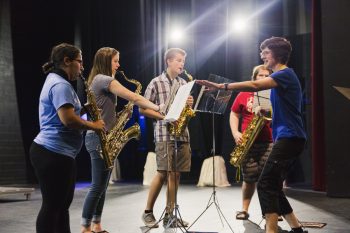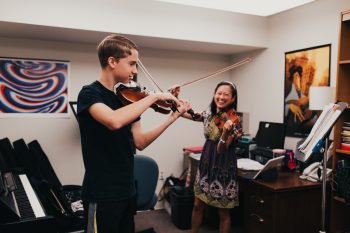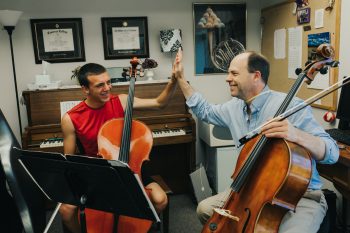By Emily Campbell
The mission of the Lutheran Music Program is to transform lives and connect people through faith and music. And every summer, high school students gather to do just that. Through its Lutheran Summer Music (LSM) Academy and Festival, students from across the country come together to deepen their understanding of faith, worship, and musical practice. During the four-week residential program, students work with private instructors, p erform in small and large ensembles, and take electives in order to become better musicians.
erform in small and large ensembles, and take electives in order to become better musicians.
The supportive atmosphere allows students to thrive and to grow into faithful musicians. Additionally, LSM partners with many Lutheran colleges, including some that offer scholarships to program alum. It is through these varied connections that LSM fosters relationships and helps to shape the next generation of church musicians.
Community and identity
Many students come into the program in order to strengthen their musical practice and work with faculty, staff, and other young musicians from across the country. But what can be harder to grasp from reading a brochure or browsing the website is the community that develops over the course of th e program.
e program.
“Students always talk about the sense of identity that they find at LSM, in finding other students that are really musically gifted,” says Molly Maillette, administrative and communications coordinator. “Many are really interested in [those relationships] but don’t necessarily fit in even in their own band at school. So, coming to LSM is finding their lifelong friends.”
Executive Director Tom Bander adds, “What we find people leaving with is the sense of community they take away from it. The community with their peers, the relationship they form with their private teacher, that one-on-one mentoring relationship. That’s the big take away; that’s what brings people back and creates the memories and the lifelong love of LSM.”
“To broaden a young person’s understanding of worship music allows their existing passion for music to become a pathway for feeling connected to the church and deepening their own faith.”
Being away from their parents for an extended amount of time, Bander likens the four-week program to consolidating the first semester of college. Through the immersive experience, students come to understand faith, music, and themselves in a way that is not provided by other settings. Regardless of background, he explains “whether or not they’re involved in their church at home, now it’s finally their own.”
Supported by their peers, counselors, faculty, and staff, students grow not only in musical ability but in their sense of identity. Many leave the program strengthened in a sense of who they are and empowered by a musical and faithful community.
Maillette emphasizes the power of witnessing students grow over the course of program: “Seeing them during registration that first weekend, a little bit wide eyed, not really knowing what they’re getting themselves into, … and they’re the first to admit that they don’t want to leave during Week Four.” She adds, “The growth that you see over four weeks is incredible. It’s something that, as a musician, I don’t remember experiencing as a high schooler. The confidence that I see as students perform on stage together or by themselves puts me at awe.”
Reframing worship music
Reframing what is often considered traditional worship music, LSM allows students to see their instruments play a major role in worship. “If you ask somebody what they think of church music and what they expect to hear on a Sunday morning, they expect to hear the organ,” explains Bander. “We say, ‘yes and.’ You can hear a bassoon, an oboe, a violin, a cello, … all kinds of music being associated with worship music.” To broaden a young person’s understanding of worship music allows their existing passion for music to become a pathway for feeling connected to the church and deepening their own faith.
By participating in LSM, students are able to see their faith and their musical practice through a new lens. As Bander states, “Your faith and your study of music don’t have to be two separate things, they can come together.” As students learn to connect their passion for music with wor ship, they also become leaders in the process and learn how to bring their experiences back home to impact the lives and worship of their home congregations.
ship, they also become leaders in the process and learn how to bring their experiences back home to impact the lives and worship of their home congregations.
“As students learn to connect their passion for music with worship, they also become leaders in the process and learn how to bring their experiences back home to impact the lives and worship of their home congregations.”
Bander adds that when students come home, “this experience can transcend not only their lives but worship lives across the country.” Furthermore, LSM brings an “optimism for the future of the church and the music within the church. We hear all the time ‘there are never any good organists anymore,’ and that we’re worried about the next generation. … For people experiencing LSM, there’s no worry. This is the future, and it’s strong. Students love it and embrace it. So, so investing in the young people of the church is worthwhile.”
The Lutheran Summer Music Academy and Festival will take place on July 1-29, 2018, at Valparaiso University in Indiana. The application is now open for interested students.

